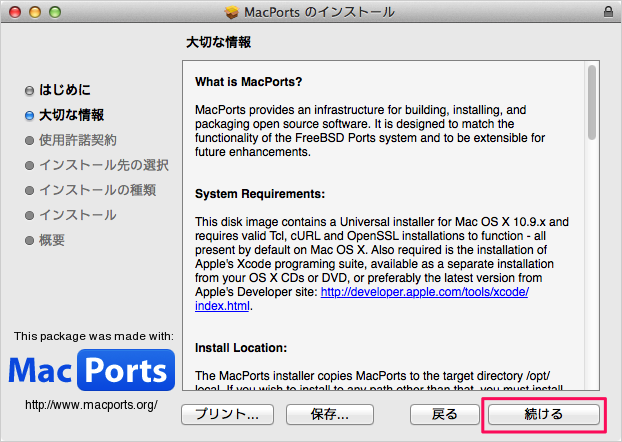

The brew command downloads and installs ImageMagick with many of its delegate libraries (e.g. To install them, type: brew install ghostscript. ImageMagick depends on Ghostscript fonts. Download HomeBrew and type: brew install imagemagick.
MACPORTS INSTALL WGET FOR MAC
Still, if you only care about getting wget working, and are happy with the built-in /usr/bin/curl (which is configured to use the macOS system-wide certificate store anyway), simply installing the certsync port might be the most straightforward solution. We recommend Homebrew which provides pre-built binaries for Mac (some users prefer MacPorts). The "broken" ports will probably still work regardless, since certsync essentially does the job of curl-ca-bundle by concatenating all your system keychain's CAs into /opt/local/etc/openssl/cert.pem, but I can't certify that. Note: It is not recommended to uninstall/deactivate a port that has dependents as If you try to proceed, you'll get warnings like this: $ sudo port install certsyncĮrror: Can't install certsync because conflicting ports are active: curl-ca-bundleĮrror: Processing of port certsync failed Note that the certsync port conflicts with curl-ca-bundle, which is in the dependency chain for many other MacPorts packages, including curl. Install Wget for Windows: Download the Complete package, except sources Setup file, named wget-setup.exe (, wildcard, refers to the version number.

But if you find the command line console stuck for a long time, you can press.
MACPORTS INSTALL WGET CODE
To add and install wget to your system you need to download the source files, compile the code and make an install. To Install Wget, Paste This In Macos Terminal After Installing Macports. possibly converting formats with openssl x509 (ugh), It seems that wget is installed with after digits the command brew install wget.extract those from your system keychain,.While not impossible, it would be a pain to This might be useful, if, for example, your Mac is pre-configured by your employer with a local root CA or other man-in-the-middle certs, or you have your own CAs for other reasons. MacPorts should create a launchd startup item to do the sync periodically, but if not, sudo port load certsync will do that (use port unload to disable it). (Hello from 2019!) There is now a certsync port which keeps the OpenSSL certificates in sync with your system keychain, which can be installed with: sudo port install certsync


 0 kommentar(er)
0 kommentar(er)
